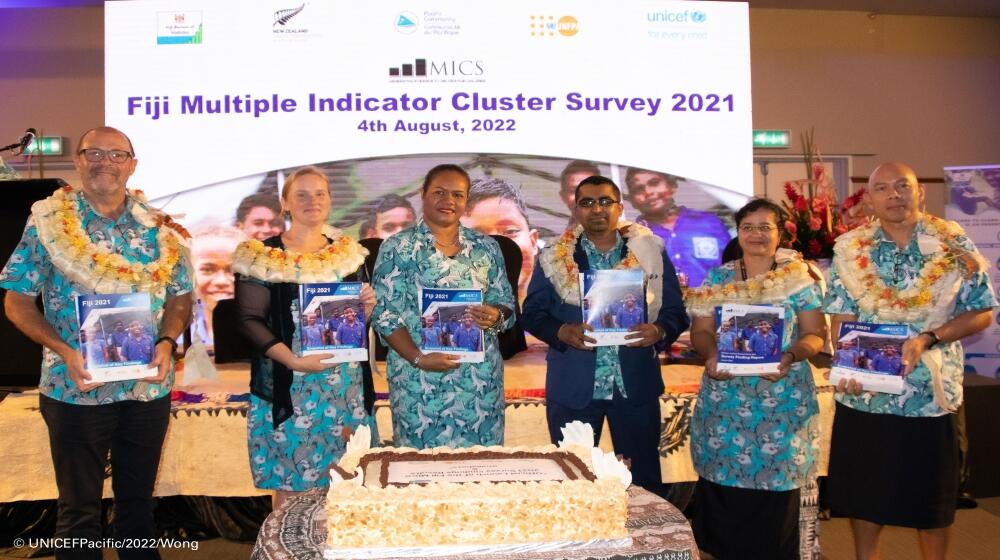Suva, Fiji 4 August 2022 – Today, the Fiji Bureau of Statistics officially launched Fiji’s first ever Multiple Indicator Cluster Survey (MICS) 2021 to support the Government in providing reliable data to measure progress on the Sustainable Development Goals.
These include data on child mortality, health, nutrition, education, child protection, on women’s health care including antenatal and post-natal care, family planning and women’s empowerment, as well as water, sanitation and hygiene. There are many indicators that are being produced for the first-time, including drinking water quality, learning skills of children and child functioning.
“The Government of Fiji recognizes the findings in the MICS 2021 survey in assisting informed decision-making by all key stakeholders, as well as development partners,” said the Permanent Secretary of the Ministry of Economy, Mr. Shiri Krishna Gounder. “The information collated will inform policies aimed at social inclusion of the most vulnerable population, help identify disparities, and allow for international comparability.”
Developed and supported by UNICEF, MICS is the largest source of statistically sound and internationally comparable data on women and children worldwide. It aims to strengthen the country’s progress towards national goals and global commitments to promote the welfare of women and children.
The Survey findings indicate considerable national progress in terms of safeguarding the interests and wellbeing of Fijians living in the country. Amongst countries in the region, Fiji has the highest coverage in antenatal care, with 98 per cent of women having at least one health visit during their last pregnancy.
Furthermore, 89 per cent of students aged 5 to 24 attending school in Fiji received school related support such as transport assistance, free textbooks or free tuition during the 2021 academic year. This is the highest coverage rate in the Pacific compared with the four MICS reports published so far in the region.
“I would like to congratulate the Fijian Government on achieving a major milestone with this MICS,” said UNICEF Pacific Representative, Jonathan Veitch. “While progress continues to be made in important areas of child development, the data reveals a mixed picture throughout the country with rural/urban, gender and age disparities. It is therefore important to focus interventions and resources on addressing these gaps, so that all Fijian children can maximize their chances to survive, thrive and realize their full potential.”
The survey also reveals areas for further development. For example, 81 per cent of children in Fiji aged between 1-14 years have experienced violent discipline, where caregivers used either physical punishment or psychological aggression to discipline children. As well as the physical harm this can cause, stress associated with violence in early childhood can permanently impair brain development and damage other parts of the nervous system.
Fiji now joins Kiribati, Tonga, Tuvalu and Samoa in the Pacific region with the release of the MICS data, which continues to aid the Government in its response activities during the global pandemic.
“Congratulations to the Government of Fiji on the release of the 2021 MICS results,” said UNFPA Pacific Deputy Director, Saira Shameem. “The availability of digitalized data on the health and well-being of women and young people, offers decision-makers the potential to align the services provided with the needs of the people, and to understand who is left behind in their ability to access all services, including sexual and reproductive health services.”
The Fiji MICS 2021, led by the Fiji Bureau of Statistics, is funded by the Government of New Zealand, with additional financial and technical support provided by UNICEF and the United Nations Population Fund. Additional technical support was also provided by The Pacific Community (SPC).
Who we are
What we do
Fiji launches first-ever nationwide MICS to monitor the well-being of all children and their families
Press Release
Fiji launches first-ever nationwide MICS to monitor the well-being of all children and their families
04 August 2022


